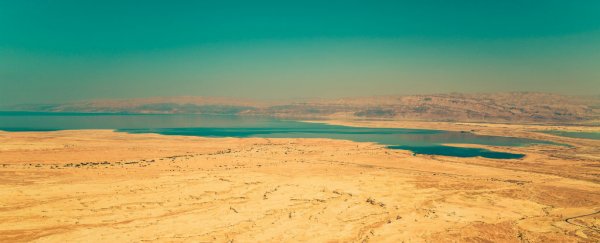Scientists have uncovered the earliest hints of human-caused changes in Earth's geological processes, and they suggest that we've been impacting the planet's climate and ecosystems for up to 11,500 years.
Based on core samples dug up from the Dead Sea, erosion rates in the area were completely incompatible with what was going on elsewhere during this time period, and suggests that human ingenuity made its mark far earlier than we thought.
"Human impact on the natural environment is now endangering the entire planet. It is therefore crucial to understand these fundamental processes," says lead researcher, Shmuel Marco, from Tel Aviv University in Israel.
"Our discovery provides a quantitative assessment for the commencement of significant human impact on the Earth's geology and ecosystems."
The find comes as a result of the Dead Sea Deep Drilling project, which involved using a 1,500-foot (457-metre) drill core to dig into the inland Dead Sea basin.
By digging deep into the basin, the researchers were able to access a sediment record of the last 220,000 years, and found a striking correlation between the beginnings of agriculture in the area and anomalies in erosion and sand deposit trends.
They found that there was roughly 3 to 4 times more fine sediment accumulating in the area during seasonal floods than in previous millennia, and this coincides with the earliest human settlement in the region.
The team suggests that as the natural vegetation was pulled up and replaced with crops, and as deforestation made way for grazing animals that further reduced the natural plants and grasses, erosion was facilitated in an unprecedented manner from 11,500 years ago onwards.
This change could not be seen in earlier sediment records stretching back to 220,000 years ago.
"We noted a sharp threefold increase in the fine sand that was carried into the Dead Sea by seasonal floods," says Marco.
"This intensified erosion is incompatible with tectonic and climatic regimes during the Holocene - the geological epoch that began after the Pleistocene some 11,700 years ago."
The find is not only important in that it extends the record of human influence on the planet, giving us more insight into what could happen in the future - it could help geologists figure out if we need to establish a new geological epoch: the controversial Anthropocene.
For years now, research groups have been urging the International Union of Geological Sciences (IUGS) to at least consider officially establishing a new, human-influenced geological epoch.
As we explained last year, in order to establish a geological epoch, scientists must confirm that the geological impact is global in scale, and is significant enough to be clearly defined in the future geological record.
For example, you might assume that the end of the Cretaceous epoch 66 million years ago was marked by the mass death of all non-avian dinosaurs, but it's actually defined by a 'golden spike' in metal iridium sediments that can be seen in Earth's strata.
When that meteorite collided with Earth to initiate the rapid demise of the dinosaurs, massive amounts of metal iridium sediment blanketed the entire globe, creating a distinct geological signature for an event that would change the world forever.
Researchers have identified plenty of human-caused changes in the geological record, such as our use of nuclear weapons since the 1950s causing radioactive sediments to settle into a whole new stratum.
Other teams have argued that the Anthropocene started as a result of the industrial revolution in the late 1700s, or all the way back in 1610, when Europeans colonised the Americas.
Earlier this year, researchers identified a sudden explosion of mineral diversity on the surface of our planet that would not exist if it weren't for humans, and argued that the Anthropocene should be established within the past three centuries or so.
While this latest evidence of human impact has only been seen in the Dead Sea region, so is nowhere near the global scale that the IUGS is looking for, it does suggest that our impact on the planet's geological processes has a far longer history than we imagined.
The research has been published in Global and Planetary Change.
